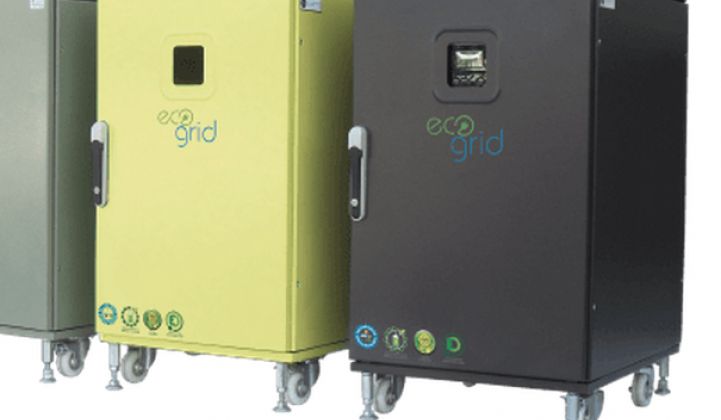Indian solar developer Acme Cleantech Solutions is looking to take on the supremacy of lead-acid batteries in the Indian energy storage market. The company’s EcoGrid battery system, the first commercial lithium-ion battery introduced in India, is also meant for a broad range of international markets.
Acme wants to install 5 megawatt-hours of storage in India this year, and claims to have a memorandum of understanding with an undisclosed European utility to commission up to 100 megawatt-hours of storage by 2017, starting this year.
“The solution was developed primarily for European grid-tied markets, in conjunction with solar,” said the company in press statement. “Acme has also developed an off-grid version of this product for [the] Indian market.”
EcoGrid is designed for residential, commercial or industrial users, and the Indian version comes with 6.6 kilowatt-hours of storage. This can be scaled up, Acme says, and “a similar solution is also applicable for large buildings, as an alternate source of backup power.”
Acme is making some impressive claims about the technology, which uses Samsung SDI batteries and is being manufactured at the company’s facilities in Rudrapur, Uttarakhand.
It says the system can be fully charged within 3 hours and has a round-trip efficiency of 95 percent, while occupying one-fifth the space and weighing a seventh of the amount of a “normal, conventional battery."
EcoGrid also has a 90 percent depth of discharge and can achieve 4,000 cycles over a roughly 10-year lifespan. Acme says it can operate at temperatures from -10 degrees to 55 degrees Celsius.
In addition, “Current conventional solutions continue to consume power when there is no load, whereas EcoGrid goes into sleep mode in such conditions, saving energy,” Acme says.
EcoGrid’s most impressive feature is its cost, however. The stated retail price is ₹350,000 (USD $5,500), which is below similar systems currently available in Europe. Without the accompanying power electronics, the Tesla Powerwall is priced at $3,500.
Furthermore, Acme head of research and development Daiva Prakash told Bloomberg: “Tesla’s Powerwall is only about battery for backup, but we’re talking about a complete storage solution. Ours is a plug-and-play device.”
According to other press reports, around 700 kilowatt-hours of EcoGrid battery storage have already been installed at Indian defense installations and “some residential and commercial locations” in Uttar Pradesh and Haryana.
The company has been targeting the telecommunications sector with its lithium-ion battery system technology for some time. In March, Acme announced its first telecommunications tower backup power system sale in India. It has been selling similar systems in Africa since mid-2014. At the time, it claimed to be seeking 110 megawatt-hours of installations across India and Africa by 2016.
“Acme has had a significant presence in the telecom tower business in India in the past,” observed Jasmeet Khurana, senior manager with the renewable energy analyst firm Bridge to India. “It has been more of a B2B company than a B2C company.”
Khurana said the EcoGrid could cater to residential and business users in India and might be of interest to businesses operating cash machines and telecommunications towers, plus small commercial establishments, as well as households.
“There is already a big market for energy storage products in India,” he said. “These products are typically used for power backup in case of power cuts. Acme wants to replace the traditional lead-acid batteries with lithium-ion batteries and add solar to that solution.”
The big challenge facing the company in India, Khurana said, is the low cost of lead-acid technology.
“It is an interesting product line,” said Khurana. “However, in the Indian market, it will still need to compete on price with similar traditional solutions using lead-acid batteries.”
Another potential problem he cited is growing competition. The Tesla Powerwall launch earlier this year has prompted a wave of copycat cut-price offerings from other vendors, and Khurana said other Indian vendors would probably join the fray.
“Acme is definitely one of the first movers, but as the cost for lithium-ion batteries reduces a lot, more companies in India will likely come up with similar solutions,” he said.



